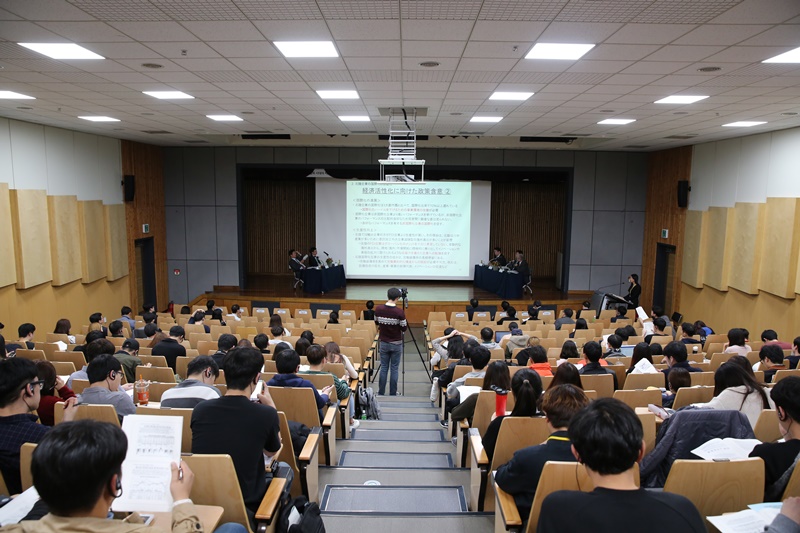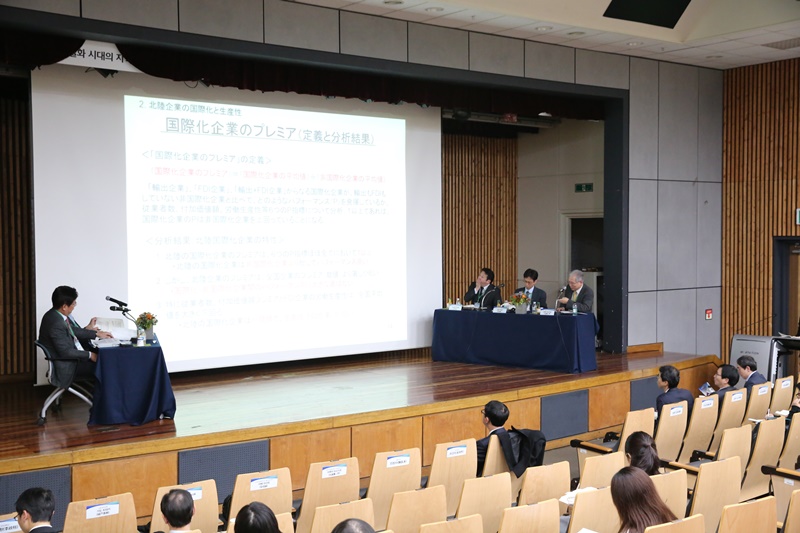- About Ajou
- Admission
- Academics
- Research
-
International
International
- Campus Life
-
News and Event
News and Event
-
AUT
AUT
Ajou News
NEW [16.11.03] Ajou's Center for Japanese Policy holds an international conference on stimulating local economies
- 2016-11-10
- 23352

Ajou's Center for Japanese Policy holds an international conference on stimulating local economies
[16.11.03]
On November 2nd, Ajou University's Center for Japanese Policy (Director Seong Bin Pak) held an international conference on stimulating local economies in Dasan Hall Auditorium. The conference was entitled 'Stimulating Local Economies amid Low Birthrate, Aging, and Globalization: Cases and Lessons of South Korea and Japan.'
Sponsored by the Japanese Foundation, the conference was designed to explore ways to stimulate local economies in the challenging environment facing the two countries, including the low birthrate, aging, globalization, and the emergence of China.
The speakers at the conference were Director Young Soo Kim of the Regional Development Studies Center under the Korea Institute for Industrial Economics & Trade, Director Seong Il Lim of the Local Investment Management Center under the Korea Research Institute for Local Administration, Director Maruya Toyojiro of the Research Institute for Regional Economics under Fukui Prefectural University, Director Abe Makoto of the East Asian Studies Group under the Institute of Developing Economies-Japan External Trade Organization, and Professor Kitamura Wataru from Osaka University
Director Young Soo Kim, the first presenter, said, "Slowing growth is a trend facing the Korean economy and it is very likely here to stay amid the declining working-age population resulting from the low birthrate and aging," adding, "The regional economies of South Korea have even more difficulties due to the combination of structural and national-level problems and the development gap between regions." As for ways to stimulate local economies, he suggested, "Each region should establish an ecosystem for industrial technology innovation focusing on the fields in which it has competitive advantages and respond to the constant industrial restructuring by identifying and fostering promising new growth engines that can best utilize the potential of the individual region." He went on to say, "An industrial adjustment promotion area needs to be operated to prevent the industrial ecosystem of the main industrial cluster from collapsing."
Director Seong Il Lim stated, "Fiscal policy is critical for regional economies to grow," adding, "It is very important to properly use subsidies from the central government. This is because most of the local governments in Korea have a financial system that is dependent on the transfer of public finances (local grant taxes and government subsidies)." On fostering regional economies, he argued "The local taxation system needs structural changes, including giving more taxation-related authority to local governments, improving the balance between national and local taxes, and decentralizing the power related to tax revenues," adding, "The transfer of public finances also needs improvements, including expanding general subsidies, restructuring the government subsidy system, and introducing capital subsidies and capital budgeting for local governments."
Director Maruya Toyojiro, the first speaker from Japan, presented on the case of Hokuriku, Japan, and its implications for South Korea. He mentioned three issues confronting local economies in Japan: the long-term depression of the Japanese economy, the low birth rate, aging, and declining population, and the disparity between centralized Tokyo and other regions in decline. To address these issues, he suggested, "First, take advantage of the opportunities from economic globalization and the growth of the world (particularly Asia). Second, pursue localization and develop regions with diverse strengths. Lastly, reform the working culture to promote women's participation, utilize the elderly and immigrants, and expand permanent workers, etc."
Director Abe Makoto said, "Restructuring is unavoidable for South Korea because global trade is shrinking in the shipbuilding, steelmaking, and petrochemical industries and Korea has lost competitiveness, with China and other emerging countries catching up," adding, "The roles of conglomerates and local governments are critical for local economies to be revitalized."
The presentation by Professor Kitamura Wataru covered the issue of 'local governments that can lose administrative functions by 2040 amid the low birthrate and aging.' He said, "The pressure for administrative reforms from the central government has reduced the structural resources for Japan's local governments to deal with issues related to the dwindling population," adding, "On average, local government officials are getting old, with retiring officials not being replaced by young people, which undermines the organizational vitality of local governments."
Ajou University Professor Jong Sik Kim served as the M.C. at the academic conference and Professor Yong Jin Kim from the University, President Chang Soo Jin from the Sejong Institute, Vice President Sung Chun Jung in charge of the Department of International Macroeconomics & Finance under the Korea Institute for International Economic Policy, etc., participated as moderators. Panelists included Professor Hee Gab Choi and Professor Seong Bin Pak from Ajou, Professor Kido Hideki from Kyoto Women's University, and Professor Jung Hwan Lee from Kookmin University.
Director Seong Bin Pak of the Division of International Studies, also Director of the Center for Japanese Policy, said, "Japan experienced the low birthrate, aging, and slowing growth ahead of South Korea and we have many lessons to learn from it," adding, "It is necessary to empower regions considering their individual characteristics in stimulating local economies. And governments, universities, companies, and financial institutions based in the regions should establish cooperative relationships in doing so."
